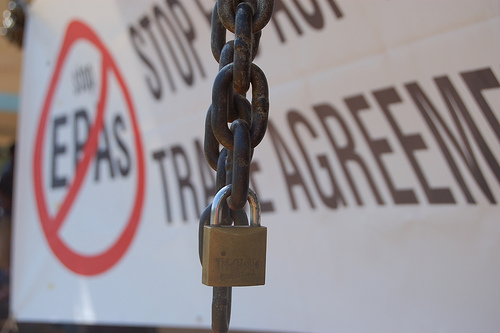Democrat - January-February 2009 (Number 112)
How the EU Operates
Trade with the Third World
Towards the end of World War II the 44 allies at a UN Monetary and Financial Conference, known as Bretton Woods, discussed how to control the international monetary and financial order. One outcome was the General Agreement on Tariffs and Trade (GATT) formed in 1947.

The key result of Bretton Woods was a system and obligation for each country to adopt a monetary policy and maintain fixed currency exchange rate within one per cent in terms of gold. The IMF had the power to plug temporary imbalances of payments. This system collapsed in 1971 when the US suspended convertibility of dollars into gold which turned the dollar into a reserve currency for Bretton Woods states. The system was designed to protect capitalism and the then socialist countries and rest of the world which included actual and former colonies did not take part.
The Lome Convention was a trade agreement first made in 1976 between the EEC and 46 former colonies. Trade was imbalanced even though these developing states were given some grants and preferential trade agreements. However, the 46 states were only allowed to export raw materials and food but not manufactures. They could not even turn coffee beans into instant coffee.
Lome was renegotiated three times and eventually replaced in 2000 by the Contonou agreement between the EU and 71 ACP countries, all former colonies of European Empires. These states in Africa, the Carribean and Pacific are known as the ACP countries.
Meanwhile in 1995 GATT was succeeded by the World Trade Organisation (WTO) with 118 states. In 2008 this had risen to a total of 153 states with China joining in 2001.
Charges were made that Lome offended WTO rules. Contonou was designed to make EU trade agreements with ACP states line up with WTO rules. The alignment was meant to conclude with Economic Partnership Agreements (EPAs) in December 2007. For the purpose of rationalising complex negotiations the 76 ACP states were divided into six groups for the purpose of negotiations on the Agreements. However divide and rule comes to mind with the EU Trade Commissioner Mandelson stating there was “no plan B” if EPAs were not in place by January 2008. Considerable pressure was put on the ACP states. To date only 35 EPAs have been concluded. Some of the ACP groups have subdivided and special interim agreements put in place. Other states have declined to sign including South Africa and Senegal.
NGO Actionaid states “the trouble with EPAs is that they could be disastrous for ACP countries. Rather than helping 76 poor countries trade out of poverty, EPAs threaten to cause more poverty and hunger. EPAs are skewed in favour of rich countries and threaten to leave 750 million poor people worse off than ever”.
Actionaid points out that unless EPAs are radically reformed, the impact in African, Caribbean and Pacific countries will include, job losses, government revenue losses and cuts in public services as developing countries are forced to open up their markets to the EU.
War on Want says “these Economic Partnership Agreements are one of the first sets of deals in the EU's new 'Global Europe' strategy. They are designed to open up the markets of African, Caribbean and Pacific countries to EU exports, and will expose small-scale producers to overwhelming competition from the world’s most powerful multinationals. As a result of this competition, even the European Commission’s own impact assessment has predicted that EPAs could lead to the collapse of the manufacturing sector in West Africa”.
It is clear that the ability for ACP governments to regulate big business in the form of transnational corporations will be severely limited. In turn this undermines both national democracy and the right to self determination.
Although part of the EPAs includes some grants going to the ACP states they are with the strings to opening up markets to free competition and controlling public expenditure - liberalisation. Precisely the same criteria imposed on EU Member States for being in the eurozone and in the EU.
This is imperialism of an indirect form to exploit all the former colonies.